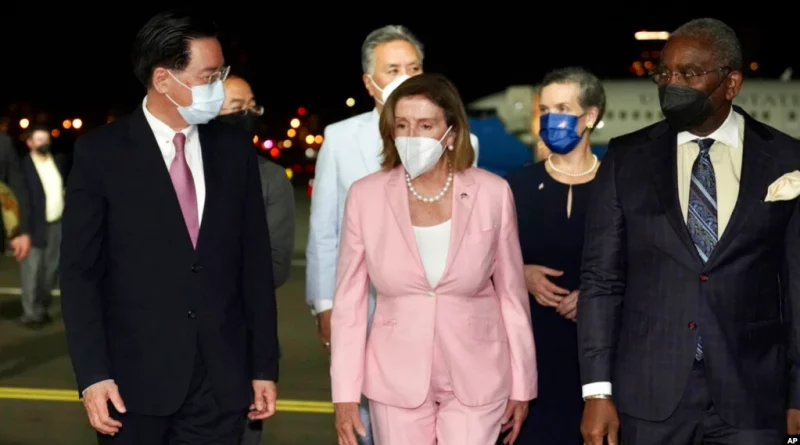Nancy Pelosi flew to Taiwan despite Beijing’s threats
Nancy Pelosi flew to Taiwan despite Beijing's threats
U.S. House Speaker Nancy Pelosi flew to Taiwan despite protests from official Beijing and harsh rhetoric and warnings from China over the past week.
Pelosi and members of her delegation disembarked from a U.S. Air Force transport plane at Sunshan Airport, in downtown Taipei, and were greeted by Taiwan’s Foreign Minister Joseph Wu and Sandra Oudkirk, the top U.S. representative to Taiwan.
Immediately after landing, Pelosi released a statement saying that “the visit of the U.S. congressional delegation to Taiwan demonstrates America’s unwavering commitment to supporting Taiwan’s vibrant democracy.”
Pelosi’s statement stressed that the conversations between the U.S. congressional delegation and Taiwan’s leadership will focus “on reaffirming our support … and advancing our common interests, including the advancement of a free and open Indo-Pacific region. U.S. solidarity with the 23 million people of Taiwan is more important today than ever as the world faces a choice between autocracy and democracy.”
The statement also said the visit “in no way contradicts U.S. policy based on the Taiwan Relations Act of 1979 and the U.S.-China joint communiqués. The U.S. continues to oppose unilateral efforts to change the status quo.”
Nancy Pelosi also wrote an article for the Washington Post that was published immediately after she landed in Taiwan. There she wrote that “the visit of our U.S. congressional delegation, in the face of increasing aggression by the Chinese Communist Party, should be seen as an unequivocal statement that America supports Taiwan, our democratic partner, defending itself and its freedom.”
Taiwan’s presidential office said President Tsai Ing-wen will meet with Pelosi Wednesday morning and have lunch with her. Reuters also wrote about Pelosi’s plans to meet with a group of activists who have been outspoken about China’s human rights situation.
China immediately condemned Pelosi’s visit and the Chinese Foreign Ministry issued a statement that the visit seriously undermines peace and stability in the Taiwan Strait, and “has a serious impact on the political basis of Sino-US relations, and seriously violates China’s sovereignty and territorial integrity.” The Chinese Foreign Ministry strongly protested to the United States.
Immediately after Pelosi’s arrival in Taiwan, White House National Security Adviser John Kirby said that the United States cannot be intimidated by threats or belligerent rhetoric from China. And that the visit is not a violation of any sovereignty issues or the longstanding U.S. “one-China policy.”
“There is no reason for this visit to be a cause for crisis or conflict,” Kirby added.
The last visit to Taiwan by the speaker of the U.S. House of Representatives was by Republican Newt Gingrich in 1997.
Washington has no formal diplomatic relations with Taiwan, but under the Taiwan Relations Act, passed by the U.S. Congress in 1979, the U.S. has pledged to provide self-defense assets to Taiwan.
